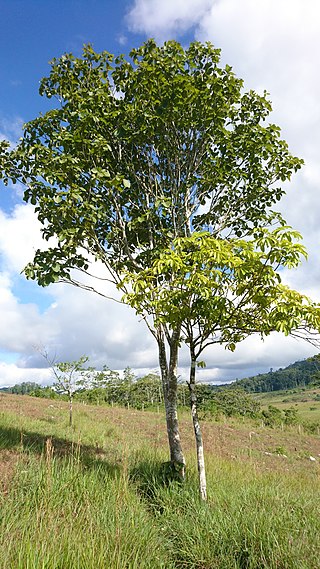
Caryophyllaceae, commonly called the pink family or carnation family, is a family of flowering plants. It is included in the dicotyledon order Caryophyllales in the APG III system, alongside 33 other families, including Amaranthaceae, Cactaceae, and Polygonaceae. It is a large family, with 81 genera and about 2,625 known species.

Cucumis is a genus of twining, tendril-bearing plants in the family Cucurbitaceae which includes the cucumber, true melons, the horned melon, and the West Indian gherkin.

Arenaria is a genus of flowering plants, within the family Caryophyllaceae.

Agathosma is a genus of about 140 species of flowering plants in the family Rutaceae, native to the southern part of Africa. Common names include buchu, boegoe, bucco, bookoo and diosma. Buchu formally denotes two herbal species, prized for their fragrance and medicinal use despite their toxicity. In colloquial use however, the term is applied to a wider set of fragrant shrubs or substitutes.

Simira is a genus of plants in the family Rubiaceae. The genus was first published by French pharmacist and botanist Jean Baptiste Christophore Fusée Aublet in Hist. Pl. Guiane vol.1 on page 170 in 1775.

Portlandia is a genus of flowering plants in the coffee family, Rubiaceae. Members of the genus are endemic to Jamaica.

Duroia is a genus of flowering plants in the family Rubiaceae. The genus is found from Costa Rica to tropical South America.

Augusta is a genus of flowering plants in the family Rubiaceae. It is found in tropical Latin America from Mexico to Brazil and also in the southwestern Pacific.

Chomelia is a genus of flowering plants in the family Rubiaceae. It is native to Mexico, Central America, the West Indies, and much of South America as far south as Argentina.
Declieuxia is a genus of flowering plants in the family Rubiaceae. The genus is found in tropical America.

Spermacoceae is a tribe of flowering plants in the family Rubiaceae and contains about 1346 species in 57 genera. Its representatives are found in the tropics and subtropics.
Cordiereae is a tribe of flowering plants in the family Rubiaceae and contains 124 species in 12 genera. Its representatives are found in central and southern tropical America.
Staelia is a genus of flowering plants belonging to the family Rubiaceae.
Sipaneopsis is a genus of flowering plants belonging to the family Rubiaceae.

Eumachia is a genus of flowering plant in the family Rubiaceae. Its species are native to tropical and subtropical regions worldwide. The genus was established by Augustin Pyramus de Candolle in 1830.











